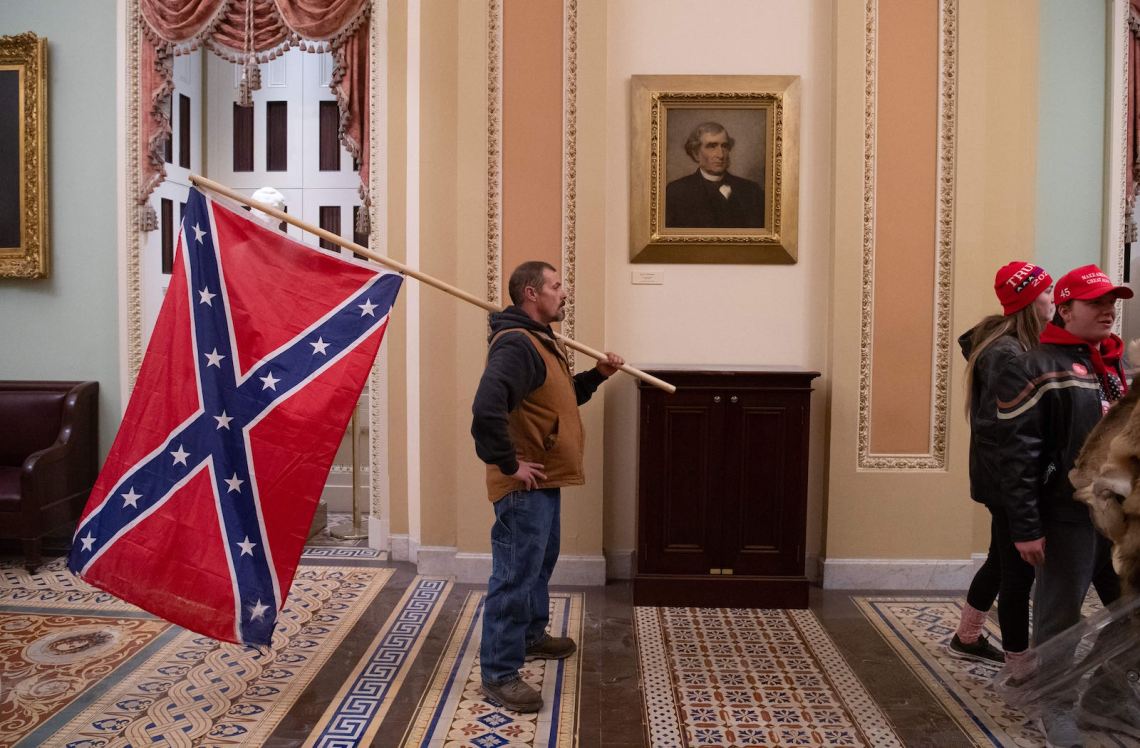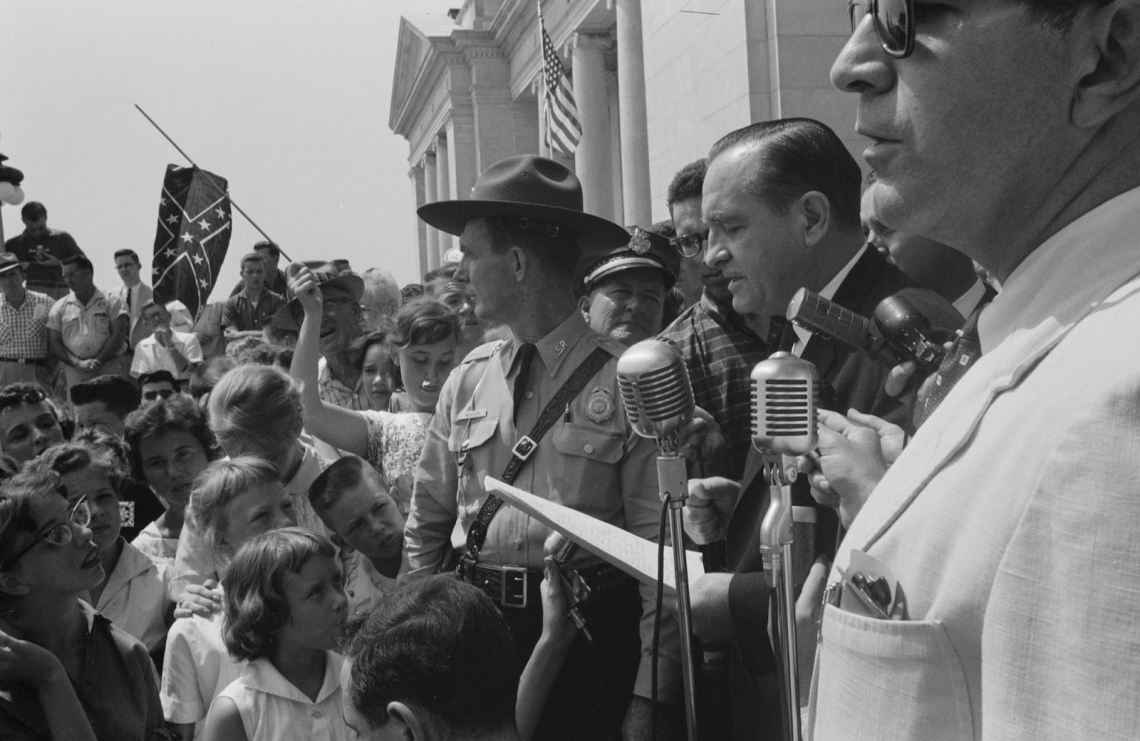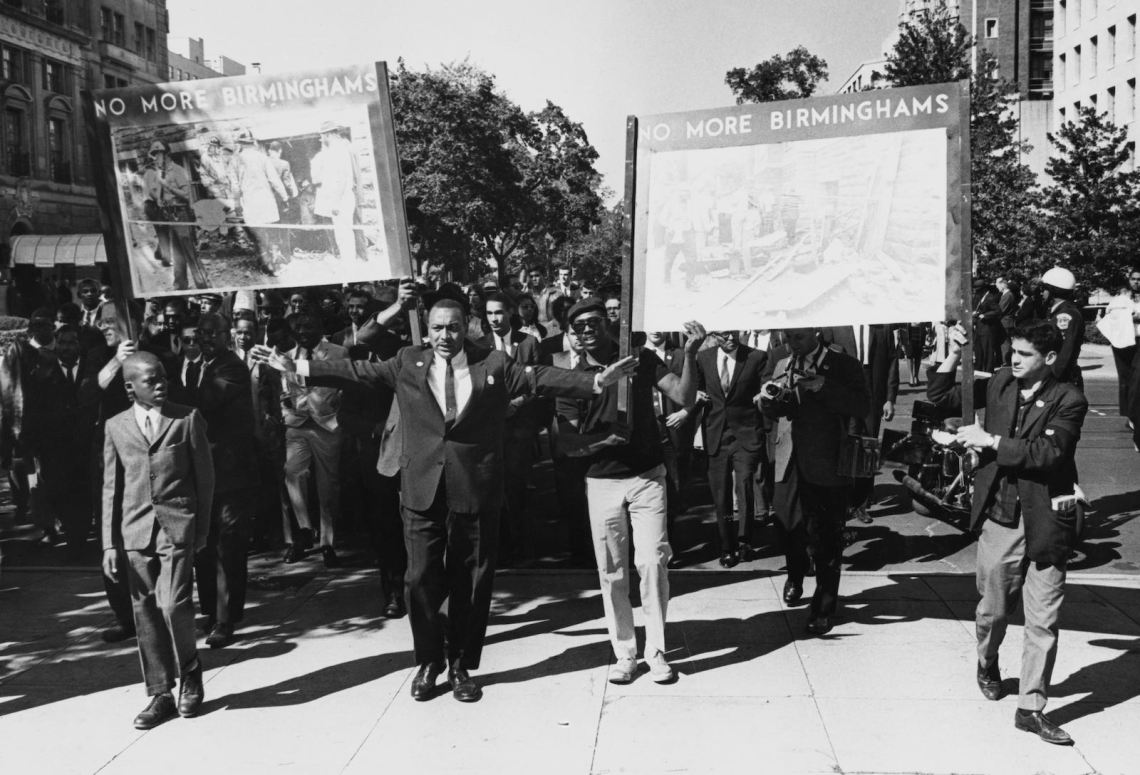Since the election of Joe Biden to the presidency, it is clear that our democracy is at a turning point. The first order of business of the Biden-Harris administration will necessarily be to undo the damage done by the Trump regime’s criminal incompetence and assault on our democratic institutions over the past four years. The Biden White House has proceeded to do that at a rapid clip, with new appointments to federal posts and a stream of executive orders designed to restore faith in government. President Biden is fond of saying that our country is facing a series of grave crises—the coronavirus pandemic, climate change, systemic racism, and economic inequality—but perhaps the biggest issue he will have to confront is the political crisis caused by the failed attempt to overturn the results of the presidential election.
American democracy is once again at a crossroads, as it was during the era of the Civil War and Reconstruction, the postwar period when the former Confederate states were readmitted to the Union. Like the secessionist slaveholders who would break the republic rather than accept the election of an antislavery president, Trump and his enablers tried to disrupt the electoral process rather than accept his decisive defeat in the election. One of the main inciters of the failed Capitol Hill putsch, Senator Josh Hawley, Republican of Missouri, is reminiscent of another politician from that state: the rabidly proslavery David Atchison, whose “Border Ruffians” regularly stole elections in Kansas in the 1850s through a campaign of terror and intimidation. “Bleeding Kansas” was a dress rehearsal for the Civil War that came soon after.
It is not a coincidence that the Capitol Hill rioters carried the battle flag of the Confederacy. The last large-scale instances of domestic insurrection in American history were the slaveholders’ rebellion of 1861 and the racist Draft Riots of 1863 in New York City. Both were quelled by the armed might of the federal government.
The history of Reconstruction reveals that moments of crisis can also provide opportunities to strengthen our experiment in democracy. With a Democratic-controlled Congress, the new administration has just such a chance to inaugurate a much needed “third reconstruction” of American democracy. Trump’s “Big Lie” parroted by large sections of the Republican Party and his attempts to interfere with the certifying of votes in several states expose how vulnerable our complicated electoral system is to illegal meddling. During the original Reconstruction, the republic rid itself of another faithless president, Andrew Johnson. As I have argued elsewhere, Trump’s true antecedent is not the oft-compared Andrew Jackson, who threatened to hang secessionists, but Andrew Johnson, who humored traitors and peddled racial bigotry. Like Johnson, Trump and his followers are fond of Confederate generals and their rebel rag of treason.
Johnson threatened the hard-won gains of the Civil War by opposing the rights of freed people in the South and encouraging violent resistance to emancipation by former Confederates. And he has the dishonor of becoming the first president impeached in American history, though his conviction in the Senate fell short by just one vote. Trump now has the dishonor of becoming the first president in American history to be impeached twice.
The Reconstruction Congress enacted the first civil rights laws in the nation’s history and expanded the role of the federal government in protecting the rights of citizens. Reconstruction-era constitutional amendments abolished slavery, established national birthright citizenship (which Trump imagined he could overturn through an executive order), decreed equality before the law for all American citizens (an ideal we still struggle to achieve), and enacted adult manhood suffrage regardless of race or previous condition of servitude. Historians often refer to the far-reaching political and constitutional changes of the first Reconstruction as “the second American Revolution” or “the second founding” of the American republic, even though its reforms still excluded women. Since then, disfranchised groups, including women, have successfully invoked “the equal protection of the laws” of the Fourteenth Amendment to establish the right to privacy, to bar discrimination on the basis of sex, and more recently, to enshrine full marriage equality.
Reconstruction also provides us with a roadmap for how to deal with racist domestic terrorism, which now looms as the greatest danger to American democracy. The last time in US history violent white mobs systematically disrupted elections, invaded government buildings, and attacked democratically elected governments was during Reconstruction. White supremacist groups like the Ku Klux Klan, the Knights of the White Camelia, White Liners, the White League, and the Red Shirts in the Carolinas (a precursor paramilitary organization to the Nazi Brownshirts and Mussolini’s Blackshirts), assassinated, assaulted, and intimidated black voters and Reconstruction politicians. Periodic riots and massacres in the postwar South upended the rule of law and democracy itself by overturning interracial state governments. Small wonder that Hitler bemoaned the defeat of the Confederacy and held up the Jim Crow South, as well as the violent dispossession of Native Americans in the West, as historical role models for the Third Reich.
Advertisement
Above all, the history of Reconstruction demonstrates the imperative to bring the full weight of the law to bear upon those attempting to overthrow democratic government by terrorist means. Initially, President Ulysses S. Grant and Congress acted forcefully, establishing the Department of Justice and passing the three Enforcement Acts of 1870 and 1871 that contained the first Ku Klux Klan. The law was initially designed to protect Southern black voters from violent intimidation. Hundreds of African Americans testified before a congressional committee to the white supremacist violence to which they were subjected in the South. The second Enforcement Act of 1871 (also known as the Ku Klux Klan Act) eventually activated federal legal intervention targeting the Klan in areas like upcountry South Carolina, which Grant declared to be in a state of insurrection and subject to martial law. Under a plan devised by Attorney General Amos Akerman, hundreds of Klan members confessed and were arrested, putting an end to Klan violence in that state.
To this end, the Biden-Harris administration has taken a good first step in announcing a comprehensive plan to combat domestic terrorism, which the Department of Homeland Security has identified as the greatest threat to national security. But the Republican Party has shown little political will or moral fortitude to hold Trump or its most violent and conspiracy laden members to account. First, former Vice President Mike Pence and Trump’s handpicked cabinet of mostly “acting” secretaries refused to invoke the Twenty-fifth Amendment to remove him from office. A few of his appointees tried to distance themselves from the unsavory taint of sedition by simply resigning their posts hours before the end of his four-year-long carnage. And now, most Republicans have closed ranks—challenging the constitutionality of Trump’s second impeachment before the trial even begins.
The Democratic majority in Congress must therefore act on its own to ensure accountability for those who brazenly attempted to disrupt the counting of the Electoral College votes and lent support for the mob that threatened to assassinate elected representatives. Members of Congress who challenged Biden’s lawful and fair election should be censured. Those who aided and abetted the violent invasion of the Capitol must be expelled and barred from office under the Fourteenth Amendment; its third section explicitly prohibits from holding office those who violate their oath to uphold the US Constitution.
The fact that Congress has not invoked the third section of the Fourteenth Amendment in recent history should be no bar to its enforcement. Extraordinary times demand extraordinary measures, and we cannot safeguard our democracy simply by pious condemnation. The prohibition should be applied to Trump as well as to all complicit officeholders, as the eminent historian Eric Foner and others have argued.
The Fourteenth Amendment ban was designed to prevent unrepentant Confederates from returning to exploit the democratic system their rebellion had sought to overturn. It can be activated without specific charges by a simple majority in both houses of Congress, but for clarity, our elected representatives should formally indict those who incited and participated in sedition against the government of the United States. Those so barred from office-holding can be pardoned only by a two-thirds vote of Congress.
The language of Section 3 of the Fourteenth Amendment is unambiguous, and it would be difficult for even the Trump-stacked judiciary to get around it. The Reconstruction congressmen who framed it clearly meant to guard against future domestic insurrections as they witnessed the resurgence of white terrorism in the South after the Civil War. For those not familiar with the words of this section, it is worth reading carefully:
No person shall be a Senator or Representative in Congress, or elector of President and Vice President, or hold any office, civil or military, under the United States, or under any State, who, having previously taken an oath, as a member of Congress, or as an officer of the United States, or as a member of any State legislature, or as an executive or judicial officer of any State, to support the Constitution of the United States, shall have engaged in insurrection or rebellion against the same, or given aid or comfort to the enemies thereof. But Congress may by a vote of two-thirds of each House, remove such disability.
Accountability must percolate down to the state and local levels where some officials have betrayed their oaths of office in attempting to overturn the result of the presidential election, and some have additionally encouraged the violent attack on Congress. State attorney generals and law enforcement officers who facilitated or participated in the riot should be removed from office immediately and prosecuted to the fullest extent of the law. All rioters who used violence to breach the Capitol should be arrested and prosecuted under the Enforcement Acts. If we do not prosecute the insurrectionists, we will be derogating from equal justice before the law. Armed and dangerous right-wing extremists would simply be incentivized to resort to violence again. To uphold the rule of law exposes the empty rhetoric of “law and order,” which really only means might makes right. That same rhetoric led to this episode of brutal lawlessness that left over a hundred police officers seriously wounded and one dead.
Advertisement
The end of Reconstruction illustrates that the lack of political will to hold domestic terrorists accountable can be far too costly for American democracy. If secession was the counterrevolution of slavery, the overthrow of Reconstruction was the counterrevolution of white supremacy. By the end of Reconstruction, many of those convicted went scot-free, and white terrorism regrouped under new names to launch a systematic campaign to overthrow the Reconstruction state and local governments in the South. The Grant administration, beset by corruption scandals and waning Northern support, dropped its rigorous prosecution of Southern white terrorist tactics.
In the presidential election of 1876, these groups successfully disrupted polling, using violence to intimidate black voters. Contested electoral returns from three southern states, Louisiana, Florida, and South Carolina, led to the creation of an Election Commission to decide which candidate should get these three states’ electoral votes. The resulting Compromise of 1877 allowed the withdrawal of federal troops from the South in return for awarding the presidency to the Republican candidate, Rutherford B. Hayes. It signaled the end of Reconstruction and the beginning of nearly a century of racial segregation, lynching, terrorism, disenfranchisement, and economic and legal servitude for African Americans. It is hardly fathomable that Ted Cruz recently lauded this misbegotten bargain that resulted in a hundred-year travesty of justice. The fact that all the states whose electoral votes Senator Cruz contested this January had in fact certified their votes, something that had not occurred in the 1876 election, does not seem to have bothered him either.
Not until the Second Reconstruction of American democracy, as civil rights activists dubbed it, nearly a century later, was the promise of the first realized. The memory of the first Reconstruction was vivid in the minds of Southern black people who participated in the modern African-American struggle for equality and citizenship. Thanks to the Reconstruction amendments, Dr. Martin Luther King Jr. could proclaim that the Constitution was on the side of disenfranchised Southern black citizens. New federal laws like the Civil Rights Act of 1964 ended Jim Crow and overthrew a century of conservative Supreme Court decisions that had weakened Reconstruction laws and amendments.
The results of the civil rights Reconstruction were contested by the “Southern strategy” of the Nixon Republican Party, which increasingly encouraged white resistance to desegregation and black voting rights. The gutting of the Voting Rights Act of 1965 by a conservative majority in the Supreme Court in 2013 and Republicans’ modern-day voter suppression techniques and gerrymandering of political districts to ensure minority rule must now be combatted by new federal laws to protect the right to vote. These underhanded methods resemble the literacy tests, the forced recitation of the Constitution before voting, the “grandfather” voting rule (you could vote only if your grandfather had voted), and the poll taxes that Southern states devised to disenfranchise African Americans during the Jim Crow era. For example, the badly GOP-gerrymandered Wisconsin state legislature ensured that in 2010 Democrats who won 54 percent of the vote in the state received only 36 percent of assembly seats. In Georgia, after its debacle in the recent elections, the state Republican Party is devising new restrictive voting laws.
Today, a third Reconstruction must once again close down these sleazy tactics that try to skirt federal laws and hobble American democracy. Congress can uphold both election integrity and democratic governance, first with a variety of short-term measures and then by working to pass constitutional amendments to preserve the sanctity of elections. It must pass the John Lewis Voting Rights Act and declare Election Day a national holiday or hold elections on a Sunday as many democracies do to facilitate voting. It should consider an overhaul of our election process, including the removal of big-money influence and the establishment of an independent national Election Commission to monitor elections and verify results.
Republicans leaders like Mitch McConnell and Kevin McCarthy briefly condemned Trump’s incitement of the Capitol Hill mob only after major corporations moved to withdraw funding from candidates who had been complicit. But the rule of law, and not big money, should determine our politics. Federal laws would preempt new measures already being contemplated by Republicans at state and local levels to hinder voting. In the long run, we will need a constitutional amendment to abolish the Electoral College, which has become an antidemocratic relic. If we ended the indirect election of senators in the Progressive era, we can do the same for presidential elections.
In Congress, we should dispense with arcane weapons of minority rule like the Senate filibuster, which enables individual senators to talk a bill to death or block legislation merely by threatening to do so—and was used, most notoriously, by Southern senators to protect Jim Crow in the 1950s and 1960s. In addition, Congress must address the fresh proposals for the statehood of Washington, D.C., and Puerto Rico; this measure, guaranteeing millions of currently disenfranchised American citizens equal representation in the federal government, is long overdue. The constitutional provision to ensure a republican form of government was often invoked during the first Reconstruction, and Congress must act on it today.
Already the forces of reaction and rebellion are regrouping with the blessing of the disgraced Trump and a majority of the Republican Party leadership. It remains to be seen how many Republican senators will continue to condone Trump’s attempted coup during the impending impeachment trial. A third Reconstruction would secure our democratic republic against that future threat. The onetime party of Lincoln has steadily devolved into an incubator of openly seditious conspiracy-mongers like Representatives Paul Gosar, Alan Biggs, Louie Gohmert, Marjorie Taylor Greene, and Lauren Boebert. That a major political party in a two-party system cannot be trusted with the levers of political power portends a major crisis in American democracy. As the abolitionist Frederick Douglass once told Andrew Johnson, we are again in danger of empowering “the enemies” rather than “the friends” of democracy.
Racism remains the fundamental flaw at the heart of the American republic, deployed to create divisions in the body politic, stymie progressive policies, and undermine democratic majority rule. Instead of working to purge itself of the assorted neo-Nazis, neo-Confederates, and white supremacists of Trump’s mob, the Republican Party is—with a pitifully few exceptions—seeking to return to business as usual with no reckoning for the extremists in its midst. As I watched the Capitol police officer Eugene Goodman fend off the violent mob and then accompany Kamala Harris to take her oath of office as vice president, I recalled Abraham Lincoln’s prophetic words:
And then, there will be some black men who can remember that, with silent tongue, and clenched teeth, and steady eye, and well-poised bayonet, they have helped mankind on to this great consummation; while, I fear, there will be some white ones, unable to forget that, with malignant heart, and deceitful speech, they strove to hinder it.





